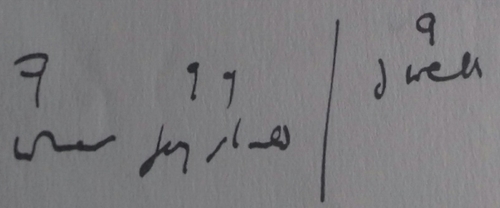Letter from Ralph Vaughan Williams to Frederick Dwelly
Letter No. VWL1135
Letter from Ralph Vaughan Williams to Frederick Dwelly
Letter No.: VWL1135
The White Gates,
Westcott Road,
Dorking.
[1930]
Dear Canon Dwelly1
Martin Shaw has shewn me your letter – False accents & ungrammatical pauses are, as you must know, inevitable in hymns where the same tune has to be sung in each verse & hymn word writers will indulge in Caesurae (is this the right word?2) across the lines.
But it surprizes me that when you have passed without comment such things as ——
‘Teach me to live that I may dread [pause mark]
The grave as little as my bed’
or
‘He spake and straight [pause mark] way the celestial choir’
and dozens of others – and object to this one which (if I remember right) we chose especially because the triple measure goes very far to mitigate the false accents – since it is possible to run on from one line to another without pause – as one cannot do in a duple time tune.3
e.g. 
Made lowly wise we pray no more for miracle & sign
And if the causal […]4
Perhaps you have been misled by the double bars – but these are as you surely know merely indications of the end of the line of words & do not necessarily mean a pause break – but if it will make you happier we will leave out the double bars after ll.1 & 3. – But it certainly won’t make matters worse by substituting a duple time tune. It is much easier to vary the accent in this tune than in one with all equal note values.
– Of course any congregation wd sing v.4

what joy should | dwell
the bar lines are only for convenience – of course it wd be very nice to have a book with every verse properly “pointed” – but I fear the library of Liverpool Cathedral wd not contain all the volumes which this wd entail.
Yours sincerely
R. Vaughan Williams
1. A Canon of Liverpool Cathedral and later the first Dean of Liverpool.
2. In fact the word VW needs is ‘enjambement’.
3. This letter arises from the enlargement of Songs of Praise which was published in 1932 and concerns hymn no. 575 (“Made lowly wise, we pray no more” by F.L. Hosmer), which is set to a triple time tune Blackbourne – though with a duple time tune (Relief) given as an alternative.
4. First lines of verses 1 and 4.
-
To:
-
From:
-
Scribe:
-
Names:
-
Subject:
-
Musical Works:
-
Format:
-
Location Of Original:
-
Location Of Copy:
-
Shelfmark Copy:MS Mus. 1714/2/5, ff.75-79
-
Citation:Cobbe 190


